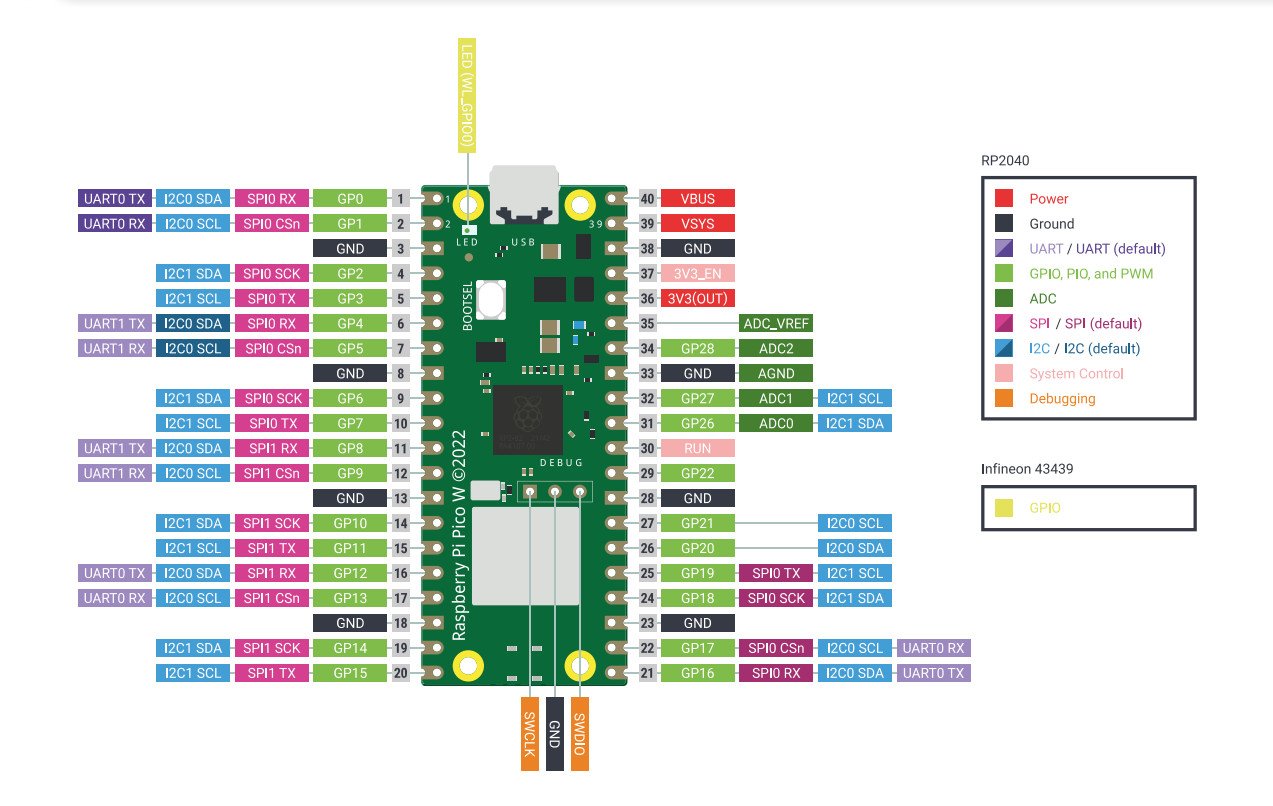Warehouse in Europe
94%+ positive feedback
30 day money back guarantee
Product description

Raspberry Pi Pico W - RP2040 ARM Cortex M0+ CYW43439 - WiFi
A small Raspberry Pi Pico module equipped with the proprietary Raspberry RP2040 microcontroller with the CYW43439 wireless communication system. RP2040 is a dual-core ARM Cortex M0 + chip clocked at 133 MHz, with 264 KB of SRAM and 2 MB of Flash memory. Thanks to the CYW43439, WiFi IEEE 802.11 b / g / n wireless communication is possible. The system has 26 GPIO pins that work with a voltage of 3.3 V, and a built-in temperature sensor. The Raspberry Pi Pico is programmed in C / C ++ and MicroPython via the microUSB connector.
Product description
A small Raspberry Pi Pico module equipped with the proprietary Raspberry RP2040 microcontroller with the CYW43439 wireless communication system. RP2040 is a dual-core ARM Cortex M0 + chip clocked at 133 MHz, with 264 KB of SRAM and 2 MB of Flash memory. Thanks to the CYW43439, WiFi IEEE 802.11 b / g / n wireless communication is possible. The system has 26 GPIO pins that work with a voltage of 3.3 V, and a built-in temperature sensor. The Raspberry Pi Pico is programmed in C / C ++ and MicroPython via the microUSB connector.

Pins of the Raspberry Pi Pico W module
The Raspberry Pi Pico W is equipped with 26 GPIO pins. Among them you can find interfaces such as: 2x SPI, 2x I2C, 2x UART, 3x ADC 12-bit, 16x PWM. The module is additionally equipped with 8 programmable IO pins (PIO), which are designed to support non-standard peripheral devices.
Raspberry Pi Pico W power supply
The board has a built-in microUSB port, which is used both for power supply and communication of the Raspberry Pi Pico W board with a computer. For proper operation, the module requires a 5V power supply. The board can also be powered from the VSYS pin with voltage from 1.8 V to 5.5 V , using, for example, a 3.7 V Li-Pol battery or a 3x AA battery.
Technical data
| System | Raspberry Pi RP2040 |
| Core | ARM Cortex-M0 + Dual-Core 133 MHz |
| Wireless communication system | CYW43439 |
| Wireless communication | WiFi 2.4 GHz IEEE 802.11 b / g / n |
| SRAM memory | 264 kB |
| Flash memory | 2 MB |
| Leads | 40-pin / 23 GPIO digital + 3 ADC pins |
| Interfaces | 2x UART, 2x I2C, 2x SPI, up to 16 PWM channels |
| Supply voltage | 5V (USB) |
| Working voltage of the logical part | 3.3 V |
| Power / data connector | microUSB |
| Dimensions | 51.3 x 21 x 3.9 mm |
Useful information
Specifications
Experimental product description generated by artificial intelligence
Raspberry Pi Pico W - RP2040 ARM Cortex M0+ CYW43439 - WiFi
The Raspberry Pi Pico W is a compact and versatile microcontroller board based on the RP2040 microcontroller chip. This powerful little board offers a cost-effective solution for a wide range of embedded projects.
Key Features
- RP2040 Microcontroller: Provides a dual-core ARM Cortex M0+ processor for efficient processing.
- Built-in WiFi: Features a 2.4GHz wireless interface (802.11n) for easy connectivity.
- Extensive GPIO: Offers numerous general-purpose input/output pins for interfacing with various components and peripherals.
- Micro USB Port: Provides power and data connectivity, as well as a means for reprogramming the flash memory.
- Flexible Power Supply: Supports a wide range of input voltages, making it suitable for various power sources.
Applications
The Raspberry Pi Pico W's versatility makes it ideal for a wide range of applications, including:
- IoT projects
- Robotics
- Wearable technology
- Home automation
- Data logging
Why Choose the Raspberry Pi Pico W?
The Raspberry Pi Pico W offers a compelling combination of features and affordability. Its small size, powerful processor, built-in WiFi, and extensive GPIO make it an excellent choice for both hobbyists and professionals. Its open-source nature and large community support ensure readily available resources and assistance.
Specifications
(Note: Specific specifications beyond those listed in the product title and description are not included in this description.)
This description is generated using artificial intelligence (AI) and may differ from the actual product. Common AI errors may include:
- Inaccurate product features: some technical specifications, colors, sizes or other parameters may be inaccurate or omitted.
- Incorrect compatibility information: AI may provide incorrect information about the compatibility of products with other devices or systems.
- Overly Optimistic Functions: in some cases functions may be provided whose product iš doesnt really have.
- Name or Model Discrepancies: AI may misrepresent the product name or model.
If you notice inconsistencies or have questions about the description, please contact us before purchasing the product, please contact us by e-mail to you: [email protected].










